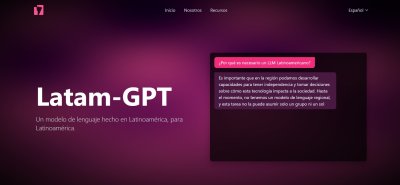Latam-GPT: Latin America Forges its Own Path in AI with Open-Source Language Model
By: @devadigax

Latin America is taking a bold step towards technological sovereignty with the launch of Latam-GPT, a free, open-source large language model (LLM) specifically designed for the region. Led by the Chilean National Center for Artificial Intelligence (CENIA), a non-profit organization, the project aims to address the critical need for AI solutions tailored to the unique linguistic and cultural contexts of Latin America. This initiative represents a significant challenge to the dominance of large technology companies from North America and Asia in the global AI landscape.
The development of Latam-GPT signifies more than just another LLM; it's a strategic move to bridge the digital divide and foster technological independence within the region. Currently, most widely used LLMs are trained primarily on data from North America and Europe, resulting in a bias towards those cultures and languages. This often leads to inaccurate or inappropriate outputs when applied to Latin American contexts, limiting their effectiveness and hindering their potential use in vital sectors like education, healthcare, and government services.
CENIA's vision extends beyond simply creating a functional LLM. By making Latam-GPT open-source, the project encourages collaboration and community involvement across Latin America. This collaborative approach is crucial for fostering local expertise, building a robust AI ecosystem, and ensuring the model's continuous improvement and adaptation to the diverse needs of the region. The open-source nature also allows for transparency, enabling scrutiny and preventing the potential for biased or harmful outputs.
The training data for Latam-GPT is a critical element of its design. It will be meticulously curated to reflect the rich linguistic diversity of Latin America, encompassing a wide range of languages, dialects, and cultural nuances. This includes incorporating data from various sources, such as literature, news articles, scientific papers, and social media content, all carefully selected to minimize bias and ensure inclusivity. The project is likely to engage with various academic institutions, research centers, and community groups across the region to collect and process this data, further strengthening the collaborative aspect of the initiative.
The implications of Latam-GPT extend beyond technological advancement. The project aims to empower local communities and individuals by providing access to cutting-edge AI technology adapted to their specific needs. This access can lead to innovation in various sectors, stimulate economic growth, and improve the overall quality of life for citizens across the region. Furthermore, by controlling its own AI infrastructure, Latin America can better protect its data sovereignty and avoid the potential risks associated with relying solely on foreign-developed technologies.
Developing a large language model is a computationally intensive task, requiring substantial resources and expertise. CENIA will likely collaborate with other organizations and institutions within Latin America and internationally to secure the necessary computational power and technical assistance. The collaborative spirit behind the project extends beyond the borders of Latin America, potentially forging international partnerships with organizations sharing a commitment to open-source AI and technological equity.
The success of Latam-GPT will not only depend on technical advancements but also on broader societal and political factors. The project's long-term sustainability will require sustained funding, continued community engagement, and supportive policies from governments across the region. Promoting digital literacy and providing access to the necessary infrastructure are equally crucial for ensuring that Latam-GPT achieves its full potential and benefits the entire population.
Latam-GPT represents a significant milestone in the global landscape of AI development. It exemplifies the growing trend towards regionalized AI solutions tailored to specific cultural and linguistic contexts. By prioritizing open-source collaboration and community involvement, this initiative demonstrates a commitment to fostering technological independence and empowering local communities. The success of Latam-GPT will serve as a powerful example for other regions striving to develop their own AI infrastructure and bridge the global digital divide. The project holds immense promise for not only Latin America, but also for the future of open-source AI development worldwide.
The development of Latam-GPT signifies more than just another LLM; it's a strategic move to bridge the digital divide and foster technological independence within the region. Currently, most widely used LLMs are trained primarily on data from North America and Europe, resulting in a bias towards those cultures and languages. This often leads to inaccurate or inappropriate outputs when applied to Latin American contexts, limiting their effectiveness and hindering their potential use in vital sectors like education, healthcare, and government services.
CENIA's vision extends beyond simply creating a functional LLM. By making Latam-GPT open-source, the project encourages collaboration and community involvement across Latin America. This collaborative approach is crucial for fostering local expertise, building a robust AI ecosystem, and ensuring the model's continuous improvement and adaptation to the diverse needs of the region. The open-source nature also allows for transparency, enabling scrutiny and preventing the potential for biased or harmful outputs.
The training data for Latam-GPT is a critical element of its design. It will be meticulously curated to reflect the rich linguistic diversity of Latin America, encompassing a wide range of languages, dialects, and cultural nuances. This includes incorporating data from various sources, such as literature, news articles, scientific papers, and social media content, all carefully selected to minimize bias and ensure inclusivity. The project is likely to engage with various academic institutions, research centers, and community groups across the region to collect and process this data, further strengthening the collaborative aspect of the initiative.
The implications of Latam-GPT extend beyond technological advancement. The project aims to empower local communities and individuals by providing access to cutting-edge AI technology adapted to their specific needs. This access can lead to innovation in various sectors, stimulate economic growth, and improve the overall quality of life for citizens across the region. Furthermore, by controlling its own AI infrastructure, Latin America can better protect its data sovereignty and avoid the potential risks associated with relying solely on foreign-developed technologies.
Developing a large language model is a computationally intensive task, requiring substantial resources and expertise. CENIA will likely collaborate with other organizations and institutions within Latin America and internationally to secure the necessary computational power and technical assistance. The collaborative spirit behind the project extends beyond the borders of Latin America, potentially forging international partnerships with organizations sharing a commitment to open-source AI and technological equity.
The success of Latam-GPT will not only depend on technical advancements but also on broader societal and political factors. The project's long-term sustainability will require sustained funding, continued community engagement, and supportive policies from governments across the region. Promoting digital literacy and providing access to the necessary infrastructure are equally crucial for ensuring that Latam-GPT achieves its full potential and benefits the entire population.
Latam-GPT represents a significant milestone in the global landscape of AI development. It exemplifies the growing trend towards regionalized AI solutions tailored to specific cultural and linguistic contexts. By prioritizing open-source collaboration and community involvement, this initiative demonstrates a commitment to fostering technological independence and empowering local communities. The success of Latam-GPT will serve as a powerful example for other regions striving to develop their own AI infrastructure and bridge the global digital divide. The project holds immense promise for not only Latin America, but also for the future of open-source AI development worldwide.
Comments
Related News

OpenAI Unveils ChatGPT Atlas: Your Browser Just Became Your Smartest AI Assistant
In a move poised to fundamentally reshape how we interact with the internet, OpenAI has officially launched ChatGPT Atlas, a gr...
@devadigax | 22 Oct 2025
In a move poised to fundamentally reshape how we interact with the internet, OpenAI has officially launched ChatGPT Atlas, a gr...
@devadigax | 22 Oct 2025

Netflix Doubles Down on Generative AI, Challenging Hollywood's Divide Over Creative Futures
In a move that underscores a growing chasm within the entertainment industry, streaming giant Netflix is reportedly going "all ...
@devadigax | 21 Oct 2025
In a move that underscores a growing chasm within the entertainment industry, streaming giant Netflix is reportedly going "all ...
@devadigax | 21 Oct 2025

AI Agent Pioneer LangChain Achieves Unicorn Status with $1.25 Billion Valuation
LangChain, the innovative open-source framework at the forefront of building AI agents, has officially joined the exclusive clu...
@devadigax | 21 Oct 2025
LangChain, the innovative open-source framework at the forefront of building AI agents, has officially joined the exclusive clu...
@devadigax | 21 Oct 2025

Meta Boots ChatGPT From WhatsApp: A Strategic Play for AI Dominance and Walled Gardens
In a significant move that reshapes the landscape of AI chatbot accessibility, OpenAI has officially confirmed that its popular...
@devadigax | 21 Oct 2025
In a significant move that reshapes the landscape of AI chatbot accessibility, OpenAI has officially confirmed that its popular...
@devadigax | 21 Oct 2025

Meta's New AI Peeks Into Your Camera Roll: The 'Shareworthy' Feature Raises Privacy Eyebrows
Meta, the parent company of Facebook, has rolled out a new, somewhat controversial artificial intelligence feature to its users...
@devadigax | 18 Oct 2025
Meta, the parent company of Facebook, has rolled out a new, somewhat controversial artificial intelligence feature to its users...
@devadigax | 18 Oct 2025
 AI Tool Buzz
AI Tool Buzz